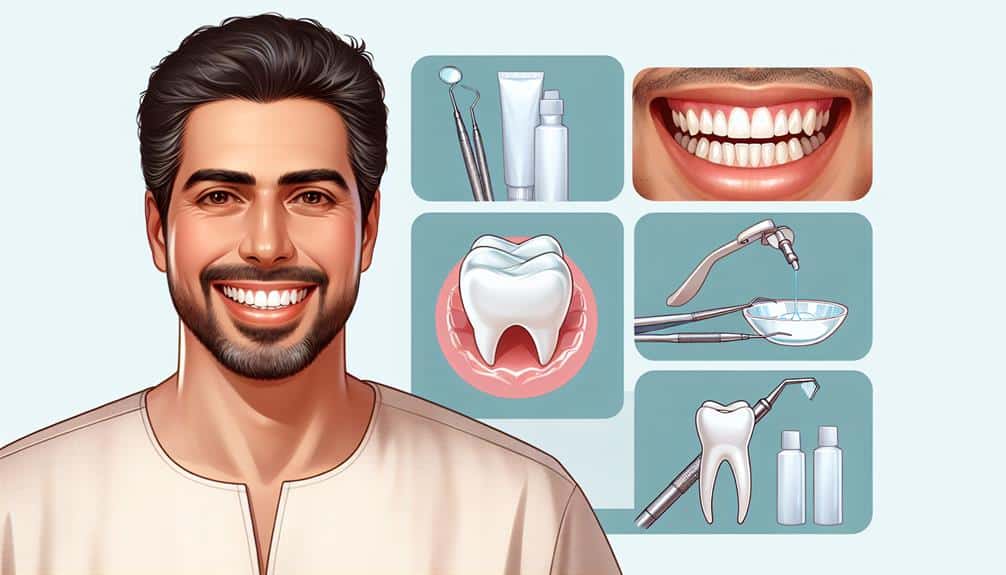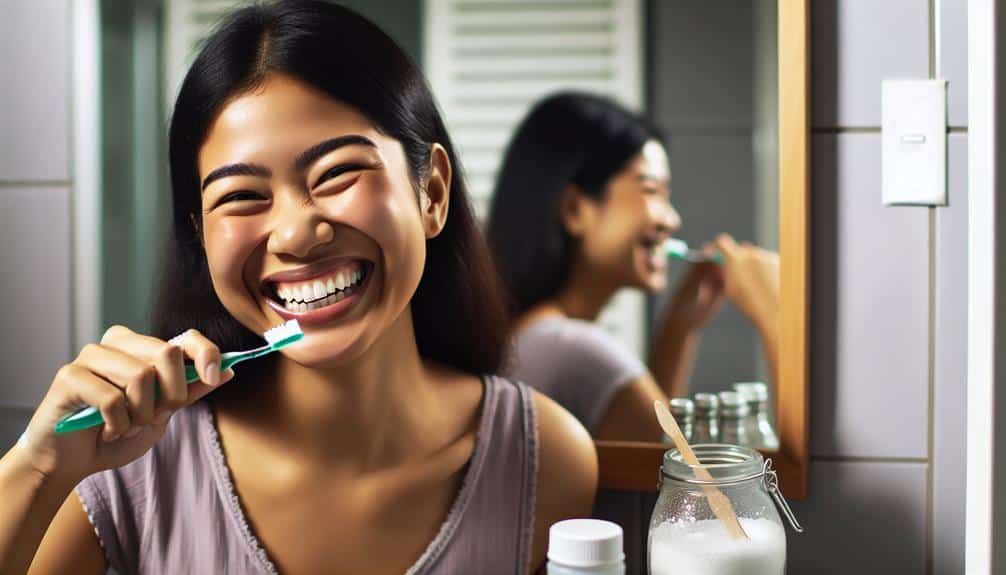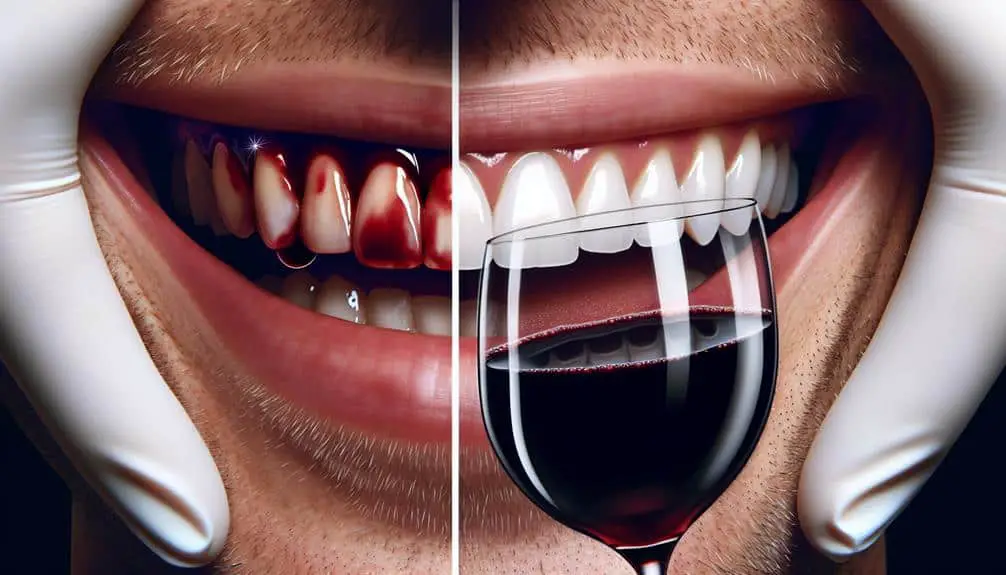Enhance your smile with simple lifestyle changes. Cut back on teeth-staining foods and beverages like coffee and red wine. Brush with whitening toothpaste containing hydrogen peroxide or baking soda. Make flossing and dental cleanings part of your routine. Opt for fruits and vegetables that naturally clean teeth. Stay hydrated with water. Explore professional whitening treatments for immediate results. Consider natural stain remedies like baking soda and coconut oil. Take these steps for a brighter smile. Discover more ways to revamp your smile with effective solutions.
Key Points
- Limit intake of staining foods and drinks to prevent discoloration.
- Brush teeth with whitening toothpaste and floss regularly.
- Opt for fruits and vegetables that naturally clean teeth.
- Stay hydrated by drinking plenty of water throughout the day.
- Incorporate natural remedies like baking soda and hydrogen peroxide for stain removal.
Causes of Lifestyle-Related Discoloration
If you're wondering why your smile has lost its brightness, lifestyle-related discoloration could be the culprit. Factors such as dietary habits and oral hygiene practices play a significant role in the color of your teeth. Your dietary choices, like consuming dark-colored foods and beverages such as coffee, tea, red wine, and berries, can stain your teeth over time.
Additionally, poor oral hygiene habits, like irregular brushing and flossing, allow plaque and tartar to build up on your teeth, leading to discoloration.
To combat lifestyle-related tooth discoloration, consider making some changes. Start by limiting your intake of staining foods and drinks. When you do consume them, rinse your mouth with water afterward or brush your teeth to minimize stains. Improve your oral hygiene routine by brushing at least twice a day, flossing daily, and visiting your dentist for regular cleanings.
These small adjustments can make a big difference in restoring the brightness of your smile.
Effective Whitening Toothpaste Options
When looking to enhance the brightness of your smile, exploring effective whitening toothpaste options can be a simple yet impactful step towards achieving a radiant appearance. Whitening toothpaste is formulated to gently remove surface stains, resulting in a brighter smile over time.
To maximize the effectiveness of your whitening toothpaste, consider the following tips:
- Check for Whitening Ingredients: Look for toothpaste containing ingredients like hydrogen peroxide or baking soda, known for their whitening properties.
- Consistent Brushing: Brush your teeth at least twice a day for two minutes each time to guarantee the whitening agents have ample time to work on your teeth.
- Avoid Staining Foods: Minimize consumption of foods and beverages that can stain your teeth, like coffee or red wine, to maintain your whitening results.
- Complement with Whitening Strips: For more stubborn stains, consider using whitening strips in addition to your whitening toothpaste regimen for a more intensive treatment.
Pairing the use of whitening toothpaste with proper oral hygiene practices can significantly brighten your smile and boost your confidence.
Lifestyle Changes for Brighter Smiles
Implementing simple lifestyle changes can contribute greatly to achieving brighter smiles and maintaining oral health. Making diet modifications is a key factor in enhancing the whiteness of your teeth. Limiting the consumption of foods and beverages that are known to stain teeth, such as coffee, tea, red wine, and dark berries, can help prevent discoloration. Opt for a diet rich in fruits and vegetables that can naturally scrub your teeth while promoting saliva production, which aids in washing away food particles.
In addition to diet modifications, incorporating positive daily habits can also make a significant difference in the brightness of your smile. Brushing your teeth at least twice a day with a whitening toothpaste, flossing regularly, and using mouthwash can help remove surface stains and prevent plaque buildup. Moreover, staying hydrated by drinking plenty of water throughout the day can enhance saliva production and assist in keeping your teeth clean.
Professional Whitening Treatments Overview
Considering professional whitening treatments to enhance the brightness of your smile? Professional whitening treatments offer effective solutions for achieving a whiter smile. Here's what you need to know:
- In-Office Procedures: Dentists perform these procedures in their office, providing immediate and noticeable results in just one session.
- At-Home Kits: These kits allow you to whiten your teeth at your convenience. They typically involve using trays and whitening gel provided by your dentist.
- Professional Guidance: Whether opting for in-office treatments or at-home kits, expert advice guarantees safety and effectiveness.
- Long-Lasting Results: Professional whitening treatments can offer longer-lasting results compared to over-the-counter options, providing you with a brighter smile for an extended period.
When choosing a professional whitening treatment, consider your lifestyle and preferences to select the option that best suits your needs. Remember to consult with your dentist to determine the most suitable whitening treatment for you.
Natural Remedies for Stain Removal
To naturally remove stains from your teeth, explore effective home remedies that can help brighten your smile. DIY remedies and herbal solutions offer gentle yet potent ways to combat dental discoloration.
Baking soda is a popular DIY option known for its mild abrasive properties that can scrub away surface stains. Create a paste by mixing baking soda with a small amount of water and brush your teeth gently with it.
Another DIY remedy is hydrogen peroxide, which has bleaching properties that can lighten stains. Use a diluted solution as a mouthwash or mix it with baking soda to form a paste for brushing.
Herbal solutions like activated charcoal and oil pulling with coconut oil are also gaining popularity for their stain-fighting abilities. Activated charcoal can absorb toxins and stains, while oil pulling can help remove bacteria and plaque that lead to discoloration.
Incorporating these natural remedies into your oral care routine can contribute to a brighter, stain-free smile.
Frequently Asked Questions
Can Certain Medications or Medical Conditions Contribute to Teeth Discoloration?
Certain medications and medical conditions can indeed contribute to teeth discoloration. Medication effects and medical conditions, if not managed properly, may impact your dental care routine and lead to noticeable changes in the color of your teeth.
How Often Should I Replace My Toothbrush for Optimal Stain Removal?
For best stain removal, replace your toothbrush every 3-4 months. Use an electric toothbrush for thorough cleaning. Choose a toothpaste with whitening properties or charcoal toothpaste for a deeper clean. Consistency in brushing frequency is key.
Are There Any Specific Dietary Habits That Can Help Prevent Teeth Discoloration?
To prevent teeth discoloration, opt for white wine over red and choose tea instead of coffee. These choices can help maintain a brighter smile by reducing the likelihood of stains caused by beverages.
Can Stress or Anxiety Have an Impact on Tooth Discoloration?
When stress impacts you, it can influence tooth discoloration. The body's response to stress can lead to changes in saliva composition, potentially affecting tooth color. Anxiety may also contribute to teeth staining through habits like teeth grinding.
Are There Any Specific Oral Hygiene Techniques That Can Help Maintain a Brighter Smile Long-Term?
To maintain a brighter smile long-term, consider incorporating whitening treatments and natural remedies into your oral hygiene routine. Regularly brushing with whitening toothpaste, using baking soda occasionally, and avoiding stain-causing foods can help preserve your smile's radiance.



